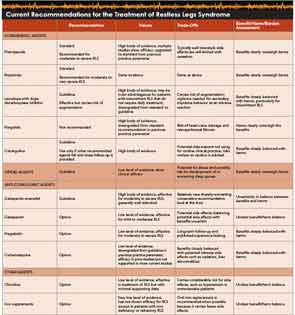Dr. Shangold’s discomfort is warranted. According to Dr. Aurora, one concern raised during the evaluation of the literature on the dopamine agonists was their long-term use. Studies have shown that patients on dopamine agonists can exhibit behavioral disturbances over time, such as pathologic gambling, shopping, eating or hypersexuality. These medications can also lead to augmentation, a worsening of the RLS symptoms. The concern over this potential long-term adverse effect is briefly touched on in the conclusion of the practice parameters. The authors state, “It is worth noting that the late development of augmentation (even after one year of continuous therapy on dopaminergic agents) remains a significant concern, and patients need to be monitored throughout therapy for this particular side effect.”
Explore This Issue
December 2012Dr. Wardrop highlighted the need for otolaryngologists to be aware of these potential complications. “Even if you don’t treat someone for RLS, you need to be aware of the side effects of these medications,” she said.
For Richard P. Allen, PhD, research associate in the department of neurology at Johns Hopkins University in Baltimore and a member of the International Restless Legs Syndrome Study Group (IRLSSG), recognition that the short-acting dopamine agonists ropinirole and ramipexole make RLS worse when used as chronic treatment over a period of years is a major advancement in treatment that was not adequately addressed in the practice parameter. He said gabapentin enacarbil and rotigotine are now better options for first-line treatment of RLS. “These should be seriously considered to avoid the significant worsening of RLS seen with long-term treatment using the current short-acting dopamine agonists.”
Dr. Wardrop agreed that gabapentin enacarbil and rotigotine may turn out to be better first-line treatment choices for RLS. However, she emphasized that both medications are relatively new, implying that longer-term evidence is needed before a standard recommendation can be given to use these drugs as first-line treatment.
Dr. Shangold pointed out that in practice many otolaryngologists already choose gabapentin enacarbil as first-line treatment because it is more familiar to them and carries fewer side effects. Use of rotigotine may also increase now that it has once again been approved by the FDA and is back on the market, he said.
Potential Application to General ENT Practice
Although most otolaryngologists who do not also practice sleep medicine may never see patients who complain of RLS, most do treat patients for sleep apnea, and some of these patients may have problems with RLS or PLMD that will need to be treated along with the sleep apnea.

Leave a Reply